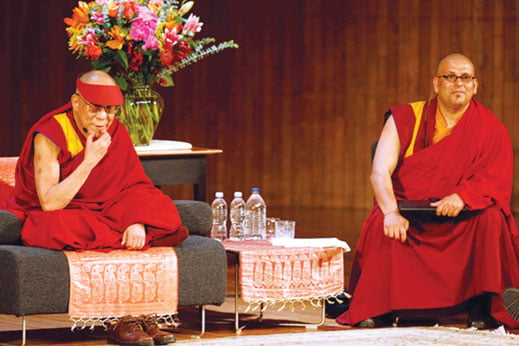As a visiting scholar and MIT’s first Buddhist chaplain in the early 2000s, the Venerable Tenzin Priyadarshi was stunned by the lack of ethics training in the U.S. education system.

“In today’s society, people are increasingly not religious or spiritual,” Priyadarshi says. “Whatever exposure they might have had to a religious version of ethics is gone. We assume people are going to learn about ethics without any training or reflection—that’s a big gamble.”
When the global financial crisis hit in late 2008—caused, in part, by breaches in business ethics—he organized informal student workshops to discuss ethical responsibility in professional and personal life. Through these popular workshops, the need for an ongoing forum for examining ethical issues became clear.
“MIT graduates receive the best training in engineering and management—they’re running Wall Street and becoming heads of state,” Priyadarshi says. “But how can they become leaders in ethics and work to create an ethical framework in society?”
After conversations with colleagues, alumni, and donors, Priyadarshi helped create the Dalai Lama Center for Ethics and Transformative Values at MIT in 2009. Though based in the Division of Student Services’ Religious Life Office, the center is a secular enterprise, founded on the vision of six Nobel Peace Prize winners. The Nobel laureates, who included Archbishop Desmond Tutu and His Holiness the Dalai Lama, helped develop the center’s mission and choose its name.
“It’s important to realize that the center is a secular organization,” says steering committee member Tinsley Galyean, PhD ’95. “The Dalai Lama has a vision for secular ethics—a set of ethical values that transcend any religion or nonreligion, and something most can agree should be cultivated in our society.”
Staffed by volunteers, the center offers ethics training for undergraduates, a speaker series called Ethics Initiatives, a Sloan program called Transformative Leadership, and a fellows program. It also incorporates ethical responsibility into conversations about science, engineering, and public policy. A 2012 event called “Will Technology Save the World?” featured faculty and researchers from the Media Lab, the departments of mechanical engineering and anthropology, and the Innovations in International Health Initiative.
“The center raises awareness of transdisciplinary, global ethical issues and provides new avenues for cross-training and education,” says steering committee member Edward DeLong, a professor of civil and environmental engineering. “It exposes the community to new perspectives and thinking from other MIT colleagues.”
In partnership with Institute groups such as the Center for Global Change Science, the center hosted more than a dozen events in 2012, including forums titled “Ecological Intelligence” and “Solving Problems versus Nurturing People in Global Development.”
“In engineering, I’d seen the danger of reducing everything to numbers,” says center fellow Manish Bhardwaj, SM ’01, PhD ’09. “In a world with very real ethical problems, it becomes hard to tackle the real solutions.”
Bhardwaj first met Priyadarshi as a graduate student, when they collaborated on a public-service project that aided tuberculosis patients in India. Today, Bhardwaj is founder and CEO of India-based Innovators in Health, a nonprofit aimed at improving drug delivery methods in impoverished areas. “There aren’t many audiences where you can talk about business in ethical, moral language,” he says. “You can’t just be happy when benefits exceed the cost. The center tries to act as the corrective.”
Sloan professor Deborah Ancona and Priyadarshi taught a Transformative Leadership course that explores how students define leadership and measure success. “We ask the students to name the best business leaders,” Ancona says. “They respond with people like Bill Gates and Steve Jobs. And then we say, ‘Take business out of it. Who are great leaders?’ They give completely different names like Gandhi and Mother Teresa.”
The discussion forces the students to reflect on how to weigh the extrinsic rewards of professional success and the intrinsic values of personal integrity. “Sitting with that dichotomy is quite powerful,” Ancona says. “It turns out that there can be very little overlap between the values we expect of our business leaders as opposed to regular leaders. Students become better leaders through this alignment process.”
Just three years old, the center is working to understand the needs of its MIT constituency. It commemorated its anniversary in the fall with a weeklong series of events that included a visit by the Dalai Lama, who spoke about the role of ethics in education.
“From kindergarten to university, we have to incorporate some kind of teaching of ethics,” he said. “We’re not talking about heaven, hell, nirvana, or the next life—we’re talking only about building a happier, healthier world.”
Keep Reading
Most Popular
Large language models can do jaw-dropping things. But nobody knows exactly why.
And that's a problem. Figuring it out is one of the biggest scientific puzzles of our time and a crucial step towards controlling more powerful future models.
How scientists traced a mysterious covid case back to six toilets
When wastewater surveillance turns into a hunt for a single infected individual, the ethics get tricky.
The problem with plug-in hybrids? Their drivers.
Plug-in hybrids are often sold as a transition to EVs, but new data from Europe shows we’re still underestimating the emissions they produce.
Google DeepMind’s new generative model makes Super Mario–like games from scratch
Genie learns how to control games by watching hours and hours of video. It could help train next-gen robots too.
Stay connected
Get the latest updates from
MIT Technology Review
Discover special offers, top stories, upcoming events, and more.